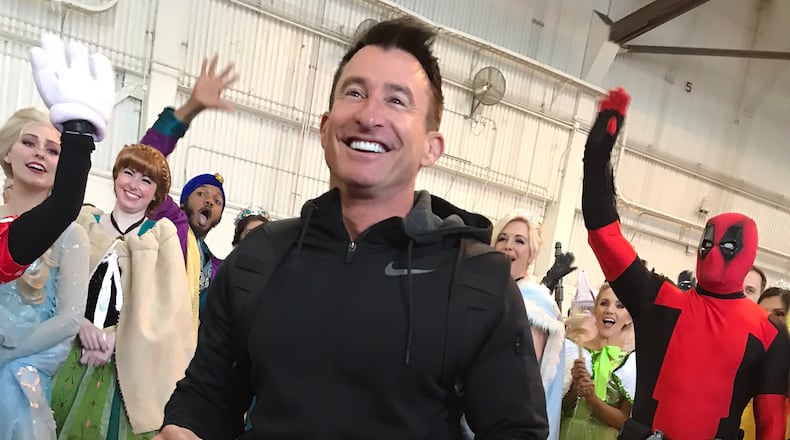Bert Weiss in 2001 had spent a decade as a sidekick on different radio shows, most notably Kidd Kraddock in Dallas. But he was itching to be the lead guy.
Brian Phillips, who helped launch alt rock station 99X a decade earlier, was starting up a new radio station on a new signal in Atlanta to take on the pop champ at the time Star 94.
Called Q100, Phillips needed a morning show and thought Weiss was ready. So he hired Weiss and gave him free rein to create his own team.
Weiss needed a good producer, so he picked Jeff Dauler, who had strong credentials at stations in Philadelphia and Phoenix. Dauler became Weiss’ sardonic sidekick, always ready with a witty aside or joke.
He then recruited Melissa Carter from 99X, where she had been the morning newsreader and would become the first openly gay morning host in Atlanta and show’s voice of reason. He also felt like he needed a recognizable name, so he convinced Lindsay O’Brien — fresh off MTV”s “Real World Seattle” — to be part of the original Bert Show team.
On March 23, 2001, he debuted the show to, what he jokingly said at the time, four listeners. He probably wasn’t that far off the mark. The station signal was pretty weak, and no Atlanta station had ever been on 100.5.
“Terrified, unsure of myself with an almost debilitating fear of failing, I opened the mic and the Bert Show officially started,” he wrote on Facebook Tuesday. “It was a disaster. But it was my disaster.”
Weiss felt like he was flailing so he met with his new boss Phillips and said, “I thought I was ready. I’m clueless. What should this show sound like? How long should the segments be?”
Phillips, Weiss said, made a managing decision that day that changed his life. He said, “Bert, this is your show. Do whatever you want, and do not be afraid to make mistakes. We’ll meet back up in two weeks and talk about formatics.”
Twenty years later and Phillips ― who is back overseeing the station again ― has yet to set up the meeting.
Weiss, using his own experience with other successful shows to create his own, focused on authenticity. For one, every radio personality used their real name and Weiss insisted they tell stories about their lives. The show added prank calls, celebrity gossip and relationship bits like War of the Roses, where a woman suspecting her boyfriend or spouse of cheating offers that person free roses and then finds out if the man will send it to his committed partner or another woman.
Credit: Q100
Credit: Q100
O’Brien, despite coming from a reality show about being real, didn’t really click and left a year later. Weiss replaced her with the upbeat Jenn Hobby, who had worked previously at 95.5/The Beat, and the team that most people identified with Bert Show 1.0 came to be, even if it was more like Bert Show 1.5.
Weiss was honest to those early listeners that the show was a work in progress.
In an interview Tuesday with The Atlanta Journal-Constitution, Weiss marveled that he was even given the chance to stumble to success. He credited Phillips and the radio company at the time Susquehanna for being incredibly patient.
“We embraced our dysfunctions,” he said. “I told them I was on anxiety meds. Phillips gave us that freedom to do our own thing. I don’t know if many radio stations today would take that chance.”
Early on, Weiss recalls two major juncture points. He and Dauler were so excited when Q100 gave them their first billboard. “We drove up to Spaghetti Junction, pulled over onto the hazard lane and stared at it,” he said. “We were so excited.”
Credit: Atlanta magazine
Credit: Atlanta magazine
Then in 2005, Atlanta magazine placed them on the cover. The headline: “The Bert Show: Yep, It’s tacky. But we can’t stop listening.”
Some of the Bert Show was not thrilled they were dubbed “tacky,” but Weiss appreciated the validation and publicity.
The station in its early years first built up a core audience among women 18 to 34, then began chipping away at Star 94′s Steve & Vikki morning show’s older fan base. By 2007, the Bert Show was beating Steve & Vikki among most women.
But up to that point, Weiss said the 100.5 signal was “draining for all of us” because they knew they could never be No. 1 without a full-market signal.
Then two things happened that gave the Bert Show the boost they needed. First, Star 94 in late 2007 decided to dump Steve & Vikki, deeming them too old.
Then in early 2008, Q100 moved from 100.5 to the much more powerful signal 99.7. This enabled the station and the Bert Show to fight Star on equal footing.
Soon, the Bert Show ratings skyrocketed. For years, they have become a top-rated show among women, often hitting double digits in share in key demographics.
In 2010, Weiss started his own syndication company and shopped the Bert Show to other markets. Weiss said the move was more defensive than offensive. It was a way to ensure greater job security for everybody on staff and pay them a fair wage without being subjected to the whims of any single radio station. The show is now in 25 cities including Kansas City, New Orleans and Nashville.
Credit: Rodney Ho/
Credit: Rodney Ho/
He has survived despite radio consolidation and changing listening habits as more people switch to streaming services. To address that, the Bert Show now has a popular app and has seen a huge increase in numbers of listeners who tune in to his show on demand via podcast. He said they now get more than 5.3 million downloads of the podcast a month, up from 1.4 million a year ago.
Weiss has also seen an almost complete turnover of his on-air staff, bringing in younger cast members to balance off the fact Weiss, at age 53, has effectively aged out of the top 40 core demographic. He has also diversified his cast, adding his first Black host, Moe Mitchell, in 2018.
“I hate doing it,” he said, referencing the cast changes. “It’s always scary. The truth of the matter is that forced change is good for the audience. You never want to get stale.”
The past two decades have also seen Weiss become a dad to two boys who were born during the earlier years of the show and are now teens. Listeners chronicle the challenges and ultimate end of first marriage as well as his current long-term relationship with Tiffany. He has used the radio to grapple with his own issues with his parents and his drinking. He did not hide the fact he was disappointed when former cast members Hobby and Dauler tried to compete directly with him on Star with their own version of the Bert Show minus Bert.
In his note to fans, Weiss noted: “Twenty years has brought so many life changes. And laughs. And tears. And wins. And losses. I’m so proud ‘cause I feel like we’ve built something more than a radio show. We built a relationship together with you guys.”
He has been working with Atlanta-based Cumulus Media for 16 years. The company bought out Susquehanna in 2005. He said they have been nothing but great to him, providing him the resources and space to do what he’s needed to do to ensure his own survival.
“In our industry, it’s an embarrassment of riches how many people I have on staff,” Weiss said. “The fact they allow me to have it places me in an advantageous position.”
About the Author
Keep Reading
The Latest
Featured







